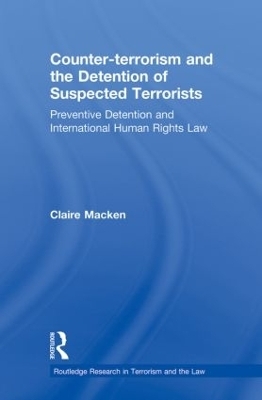
Counter-terrorism and the Detention of Suspected Terrorists
Preventive Detention and International Human Rights Law
Seiten
2013
Routledge (Verlag)
978-0-415-85921-9 (ISBN)
Routledge (Verlag)
978-0-415-85921-9 (ISBN)
This book analyses the preventative confinement of suspected terrorists with regard to different models of counter-terrorism policy within the context of international human rights law. The book is written from a global perspective drawing on cases and practice from different jurisdictions including the US, the UK and Australia.
In a regional, national and global response to terrorism, the emphasis necessarily lies on preventing the next terrorist act. Yet, with prevention comes prediction: the need to identify and detain those considered likely to engage in a terrorist act in the future. The detention of ‘suspected terrorists’ is intended, therefore, to thwart a potential terrorist act recognising that retrospective action is of no consequence given the severity of terrorist crime. Although preventative steps against those reasonably suspected to have an intention to commit a terrorist act is sound counter-terrorism policy, a law allowing arbitrary arrest and detention is not. A State must carefully enact anti-terrorism laws to ensure that preventative detention does not wrongly accuse and grossly slander an innocent person, nor allow a terrorist to evade detection.
This book examines whether the preventative detention of suspected terrorists in State counter-terrorism policy is consistent with the prohibitions on arbitrary arrest and detention in international human rights law. This examination is based on the ‘principle of proportionality’; a principle underlying the prohibition on arbitrary arrest as universally protected in the Universal Declaration of Human Rights, and given effect to internationally in the International Covenant on Civil and Political Rights, and regionally in regional instruments including the European Convention on Human Rights.
The book is written from a global counter-terrorism perspective, drawing particularly on examples of preventative detention from the UK, US and Australia, as well as jurisprudence from the ECHR.
In a regional, national and global response to terrorism, the emphasis necessarily lies on preventing the next terrorist act. Yet, with prevention comes prediction: the need to identify and detain those considered likely to engage in a terrorist act in the future. The detention of ‘suspected terrorists’ is intended, therefore, to thwart a potential terrorist act recognising that retrospective action is of no consequence given the severity of terrorist crime. Although preventative steps against those reasonably suspected to have an intention to commit a terrorist act is sound counter-terrorism policy, a law allowing arbitrary arrest and detention is not. A State must carefully enact anti-terrorism laws to ensure that preventative detention does not wrongly accuse and grossly slander an innocent person, nor allow a terrorist to evade detection.
This book examines whether the preventative detention of suspected terrorists in State counter-terrorism policy is consistent with the prohibitions on arbitrary arrest and detention in international human rights law. This examination is based on the ‘principle of proportionality’; a principle underlying the prohibition on arbitrary arrest as universally protected in the Universal Declaration of Human Rights, and given effect to internationally in the International Covenant on Civil and Political Rights, and regionally in regional instruments including the European Convention on Human Rights.
The book is written from a global counter-terrorism perspective, drawing particularly on examples of preventative detention from the UK, US and Australia, as well as jurisprudence from the ECHR.
Dr Claire Macken is the Associate Head of School (Teaching and Learning) in the School of Law at Deakin University, Australia.
1. Preventive Detention – Background, History and Practice 2. The Right to Personal Liberty in International Human Rights Law as a Legal Framework for the Consideration of State Preventive Detention Laws 3. The Preventive Detention of Suspected Terrorists Pursuant to a State of Emergency in International Human Rights Law 4. Legitimate and Illegitimate Purposes of Preventive Detention 5. The Way Forward – A Model Law for the Detention of Suspected Terrorists within a Criminal Law Framework 6. Conclusions as to the Preventive Detention of Suspected Terrorists in International Law
| Reihe/Serie | Routledge Research in Terrorism and the Law |
|---|---|
| Verlagsort | London |
| Sprache | englisch |
| Maße | 156 x 234 mm |
| Gewicht | 453 g |
| Themenwelt | Geisteswissenschaften ► Philosophie |
| Recht / Steuern ► Allgemeines / Lexika | |
| Recht / Steuern ► EU / Internationales Recht | |
| Recht / Steuern ► Öffentliches Recht ► Völkerrecht | |
| Recht / Steuern ► Strafrecht ► Besonderes Strafrecht | |
| ISBN-10 | 0-415-85921-2 / 0415859212 |
| ISBN-13 | 978-0-415-85921-9 / 9780415859219 |
| Zustand | Neuware |
| Haben Sie eine Frage zum Produkt? |
Mehr entdecken
aus dem Bereich
aus dem Bereich


